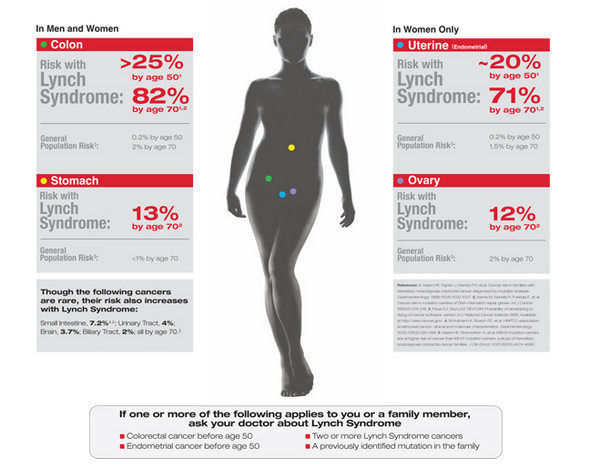Genes are the individual packets of information we inherent from her parents. They help determine traits hair color, eye color and disease susceptibility. All our genes are present in pairs. One gene in each pair is passed down from our mother and the other from our father. Genes provide instructions that tell a cell what to do. Some genes instruct a cell to grow and divide. Other genes are responsible for telling cells how to break down certain substances in the body that are harmful.
Genes and environmental factors together play a role in the occurrence of cancer. There may be different causes for cancer in one individual versus another. Sometimes, we see a specific pattern of cancer in the family called a cancer syndrome. A syndrome describes a group of features that repeatedly occur together. A cancer syndrome is present when several family members have the same type of cancer, or a cluster of specific forms of cancer. A single susceptibility gene in a family causes these cancers. Other forms of cancer may be caused by a variety of other mechanisms, such as familial exposure to environmental or dietary risk factors, several genes working together to contribute to cancer formation, or even by chance alone.
Your personal and family history alone is highly suggestive of a hereditary cancer predisposition syndrome known as Lynch syndrome (also known as hereditary non-polyposis colorectal cancer or HNPCC) based upon the reports of colon cancer in your family and/or your family having multiple cancers including colon, urothelial cancer, sebaceous adenomas or cancer or other cancers.
Lynch Syndrome, also known as hereditary non-polyposis colon cancer (HNPCC) syndrome is a condition in which the tendency to develop colon or rectal cancer is inherited. Non-polyposis means that colorectal cancer can occur when only a few polyps or no polyps are present. In Lynch Syndrome, colon cancer occurs at an average age of 45 and tends to occur on the right side of the colon. Individuals with Lynch syndrome have as high as an 80% lifetime risk to develop colon cancer. Individuals that have already had colon cancer, but still have remaining colon, have up to a 60% chance to develop another colon cancer.

| Uterus | 40-60% lifetime risk |
| Ovary | 13% lifetime risk |
| Stomach | 13% lifetime risk |
| Small intestine | 5% lifetime risk |
| Brain | 4% lifetime risk |
| Ureter/ kidney | 4% lifetime risk |
| Biliary tract | 2% lifetime risk |
The age of onset is generally the fourth decade of life. Lynch Syndrome is inherited as an autosomal dominant condition and first degree relatives (parents, siblings and children) of an affected individual will have a 50% risk of developing colon polyps. The syndrome affects men and woman and can be inherited from either parent. Without any interventions most persons with Lynch will develop colon or rectal cancer in their lifetime.
Recommendations for individuals who are known to have Lynch Syndrome:
- Colonoscopy every 1-3 years starting at age 20-25 or 10 years before the earliest diagnosis
- Endometrial aspiration, pelvic exam and transvaginal ultrasound every 1-2 years starting at age 25-35
- Consideration of a full colectomy if diagnosed with colon cancer
- Consideration of a prophylactic colectomy if precancerous polyps are found during screening or for select patients who decline screening after testing positive.
- Consideration of a hysterectomy and oopherectomy when childbearing is complete
- If gastric cancer in the family, upper GI every 1-2 years starting at age 30-35
- If urinary tract cancer in the family, ultrasound and urinalysis every 1-2 years starting at age 30-35
